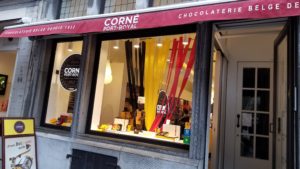When people visit any large city, they are often bombarded by a multitude of souvenir shops. As a result, some tourists experience choice overload, whereby they fail to buy any souvenir because there are simply too many options to pick from. In such cases, partnerships with other tourist services may be beneficial.
Recently, on a trip to Brussels, I was in the mood to bring home some Belgian chocolates. Yet, because I’m not a chocolate connoisseur, I could not decide which store to stop at. I did not want to stop at the ones on the main square because I was afraid to walk into a tourist trap. But I did not want to go to the most famous brand names either since I knew that I would simply be paying for the brand and not so much the actual chocolate quality. After wandering around all morning, I was ready to give up on my chocolate buying initiative.
 So, I went over to take a tour of the upper neighborhood of Brussels instead. To my surprise, the upper neighborhood tour ended with a chocolate tasting at this chocolate store. At the end of the tasting, the guide informed us that we have a 10% discount if we buy anything from the store because we were a part of the tour.
So, I went over to take a tour of the upper neighborhood of Brussels instead. To my surprise, the upper neighborhood tour ended with a chocolate tasting at this chocolate store. At the end of the tasting, the guide informed us that we have a 10% discount if we buy anything from the store because we were a part of the tour.
This type of marketing is very clever for multiple reasons. For one, since Belgium is famous for its chocolates, most tourists are predisposed to buying a pack of chocolates. All they need is a little nudge. Both being in the store and the exclusive 10% incentive usually reduce the buying friction enough to lead to a sale.
If that is not enough though, this promotion benefits from the law of reciprocity: since the store gave the tour goers a free chocolate, they feel the need to return the favor (i.e. to buy some goodies). This is also beneficial for the tour guide since he is likely to get a larger tip as the tour goers will want to “pay” for their chocolate. Finally, this benefits from a trust relationship. After following an interesting tour, the tour goer has a certain level of trust in the tour guide. They also know that the tour guide would not risk his company’s brand in a bad endorsement because they realize the repercussions that may come with online reviews. Consequently, the tour goer faced with this offer is more likely to act on it because this store is endorsed by a company that just provided them a great service.
Would you take the promotion? If yes, what was the best convincing factor? If no, what was lacking for you?